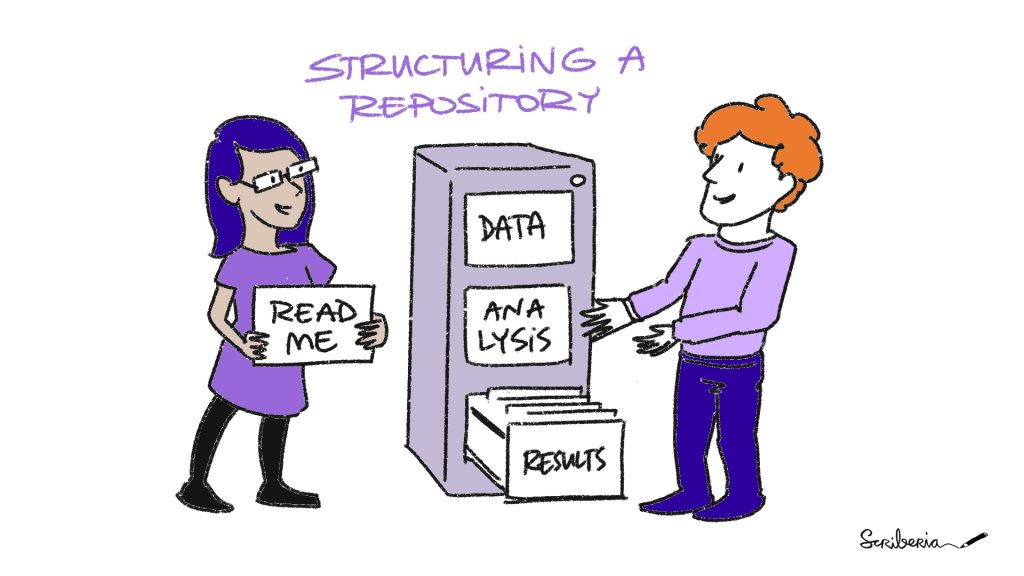 Source: File Management Manual. The Turing Way Community. This illustration is created by Scriberia with The Turing Way community, used under a CC-BY 4.0 licence. DOI: 10.5281/zenodo.3332807
Source: File Management Manual. The Turing Way Community. This illustration is created by Scriberia with The Turing Way community, used under a CC-BY 4.0 licence. DOI: 10.5281/zenodo.3332807
Research data frequently remains valuable after the life of the research project for which it was generated. Sharing data can open up new avenues of research and enquiry without researchers having to recreate and collect identical data. Due to this, and other factors, research funders are increasingly requiring researchers to share their data.
Researchers should plan how and when to share their data (if it can be shared), whether there are reasons it cannot be shared, and how to ensure that other researchers will be able to make correct use of it.
Why should you share your research data?
- Increases the academic profile of researchers, by ensuring credit is given to data as a research output in its own right.
- Increases the impact and visibility of research.
- Raise interest in publications. One study found a 69% increase in citations for articles whose associated data were available online.
- Complies with many funders’ requirements, including making best use of investment by avoiding replication.
- Allows data to be independently validated and tested.
- Leads to new collaborations and partnerships.
- Provides great resources for education and training.
Every data management plan requirement will expect information about how the data collected will be shared for public access, or to specify if the data should not be shared. Acceptable exceptions to sharing data generally apply to data that might compromise research subjects or be tied to intellectual property, such as patents.
When should your data be shared?
Each funding agency has different requirements for when data and research articles must be made available. In your data management plan (DMP) you should indicate when you will share them. Some options are:
- Share data in real-time, as your research progresses. Sharing data as they are collected is rare. Doing so can pose significant logistical challenges and could help other researchers to “scoop” you. The most prominent setting in which real-time data sharing does and should occur is in crises, such as global epidemics.
- Share data when you submit the manuscript with which they are associated for review by a journal.
- Share data at the same time that the book or article that they underpin is published.
- Share data after an embargo period.
Where should your data be shared?
Depositing your data in an archive will facilitate its discovery and preservation. While you can share your data informally by emailing it to requestors or posting it to a website, informal methods of sharing make it difficult for people to find your data and access it in the long-term.
What you need to consider when depositing your research data?
1. Check your funder requirements:
Your funder(s) may mandate which repository you should use and they may also have other criteria about period of storage or the use of embargoes.
2. Check for discipline specific repositories:
Where possible, deposit your data in a discipline specific repository. This repository is more likely to have the best metadata schema for your datasets and will be where other researchers in your field expect to find them. Some consolidated disciplinary repositories are:
- Zooarchaeology and Bioarchaeology: IsoArcH.
The re3data registry of data repositories is the best place to search.
3. Archive your data in our institutional repository: Research Data Repository (CORA.RDR).
CORA.RDR is a federated and multidisciplinary data repository that allows Catalan universities and CERCA research centres to publish sets of research data in a FAIR way and following the guidelines of the European Open Science Cloud (EOS).
CORA.RDR follows the Open Archives Initiative model, which allows visibility of the documents from different platforms and collectors such as Google Scholar, BASE, CORE, etc. A unique identifier (DOI) is provided to each dataset and author identifiers (ORCID) are used.
CORA.RDR is free for ICAC researchers.
Next to supplemental materials not being aligned with the FAIR principles, there are other reasons why a data repository is a better solution:
Sources :
Choosing a repository (University of Edinburgh): https://www.ed.ac.uk/information-services/research-support/research-data-service/after/choosing-a-suitable-repository
Data Repositories (The Turing Way Community). https://the-turing-way.netlify.app/reproducible-research/rdm/rdm-repository
Piwowar HA, Day RS, Fridsma DB (2007) Sharing Detailed Research Data Is Associated with Increased Citation Rate. PLoS ONE 2(3): e308. https://doi.org/10.1371/journal.pone.0000308
Sharing data (University College London): https://www.ucl.ac.uk/library/open-science-research-support/research-data-management/best-practices/how-guides/sharing-data
Last updated: 22/02/2024